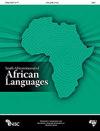The categorisation of questions in the assessment of language subjects for multilingual learners in South African primary schools
IF 0.4
0 LANGUAGE & LINGUISTICS
引用次数: 0
Abstract
AbstractThis study examines the structure and cognitive demands of questions found in Grade 5 learners’ English first additional language (FAL) and isiZulu home language (HL) subject workbooks. Using document analysis as the qualitative method, the present study provides an analysis of different comprehension task questions using Bloom’s revised taxonomy of educational objectives (BRT) as a framework for evaluating the standard and existence of a continuum of thinking skills expected of learners from the curriculum. The results show that English and isiZulu language subjects do not follow an equitable assessment order from basic remembering to the highest level category of creating in the categorisation of questions. This implies that English FAL enjoys a more systematic categorisation of questions, allowing learners to answer questions at a lower processing level to a higher cognitively demanding level of question processing. Whereas, in isiZulu HL, the categorisation is mixed from a higher level of question processing to a medium level of processing in a non-systematic manner. It is suggested that curriculum developers harmonise these assessment levels and standards to better scaffold Grade 5 learners’ (average age 10 to 11 years old) ability to answer questions correctly according to their cognitive levels.南非小学多语学习者语言科目评估中的问题分类
摘要本研究考察了五年级学生英语第一附加语言(FAL)和isiZulu母语(HL)科目练习册中问题的结构和认知需求。本研究采用文献分析作为定性方法,对不同的理解任务问题进行了分析,使用布鲁姆修订的教育目标分类法(BRT)作为评估课程对学习者期望的连续思维技能的标准和存在的框架。结果表明,英语和isiZulu语言被试在问题分类中没有遵循从基本记忆到最高级创造的公平评估顺序。这意味着英语FAL有更系统的问题分类,允许学习者从较低的加工水平回答问题到更高的认知要求的问题加工水平。然而,在isiZulu HL中,分类以非系统的方式从较高水平的问题处理混合到中等水平的处理。建议课程开发人员协调这些评估水平和标准,以更好地支撑五年级学生(平均年龄10至11岁)根据他们的认知水平正确回答问题的能力。
本文章由计算机程序翻译,如有差异,请以英文原文为准。
求助全文
约1分钟内获得全文
求助全文
来源期刊

South African Journal of African Languages
LANGUAGE & LINGUISTICS-
CiteScore
0.50
自引率
0.00%
发文量
30
期刊介绍:
The South African Journal of African Languages is a peer-reviewed research journal devoted to the advancement of African (Bantu) and Khoi-San languages and literatures. Papers, book reviews and polemic contributions of a scientific nature in any of the core areas of linguistics, both theoretical (e.g. syntax, phonology, semantics) and applied (e.g. sociolinguistic topics, language teaching, language policy), and literature, based on original research in the context of the African languages, are welcome. The journal is the official mouthpiece of the African Language Association of Southern Africa (ALASA), established in 1979.
 求助内容:
求助内容: 应助结果提醒方式:
应助结果提醒方式:


